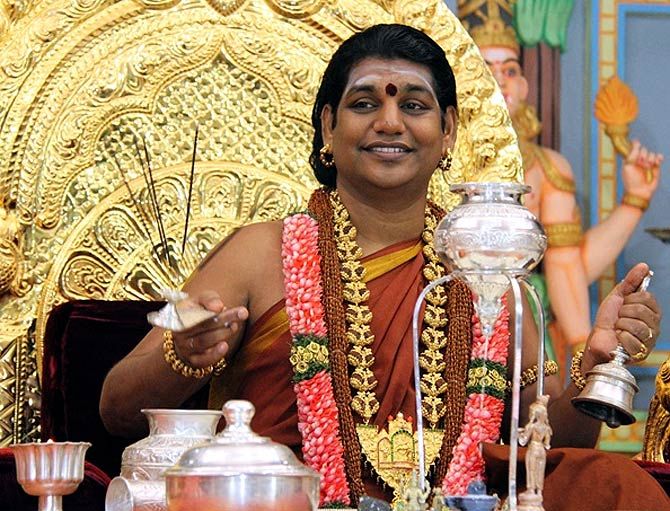'It's a moot point if Kailaasa will ever evolve beyond being a haven for a fugitive from justice,' notes Devangshu Datta.

An apocryphal story features a meeting between Queen Victoria and Cecil Rhodes in the late 19th century.
The empire builder had returned to Britain after years in Africa.
The Queen asked, 'What have you been doing since we last met, Mr Rhodes?'
Rhodes replied, 'I have added two dominions to your majesty's empire.' (Northern Rhodesia and Rhodesia, now Zambia and Zimbabwe).
The Queen responded, 'Oh thank you, Sir Cecil!'
The global political map was malleable then.
It continued to see major changes until the 1990s.
Apart from the nations that emerged from the Soviet Union, South Sudan, East Timor and Kosovo have also been carved out in the recent past.
The latest attempted addition is an island called Kailaasa.
A fugitive fleeing from rape charges in India has bought an island off the coast of Ecuador.
He's set up a Web site which calls it 'nation without borders created by dispossessed Hindus who lost the right to practice Hinduism authentically'.
Kailaasa's owner, Nithyananda, used delaying tactics to avoid trial in a case filed back in 2010.
An inmate of his ashram claimed she had been repeatedly raped over a period of five years.
Along with the godman, five of his chelas (disciples) faced charges under Sections 376 (rape), 377 (unnatural sex), 420 (cheating), 114 (criminal abetment), 201 (disappearance of evidence, giving false information), 120B (criminal conspiracy) and so on.
Along with disappearing evidence, the main accused himself disappeared.
He ended up in Ecuador which doesn't have an extradition treaty with India.
Although India could make an extradition request, there are no guarantees the request would be granted.
The Latin American nation has also historically been sympathetic to requests for political asylum.
This is why Julian Assange took refuge in the Ecuadorean embassy when he was facing rape charges.
It is quite likely that Nithyananda will claim political persecution claiming he's not being allowed to practice Hinduism 'authentically', whatever that means.
Given good legal counsel, and as the owner of significant real estate, he might well escape extradition, even if the Indian government makes any serious effort to bring him back.
Kailaasa would be technically described as a micro-nation.
There are many such examples, set up in various places by sundry criminals and eccentrics.
The Lonely Planet actually has a Guide to Home-made Nations among its publications.
Some micro-nations such as Christiana in Copenhagen, Denmark, are seen as great tourist destinations.
The 1,000-odd 'citizens' of Christiana have Danish passports.
Similarly, Parva Domus in Uruguay has been around since 1878.
It's commemorated in Uruguay's stamps and treated much like an Indian housing society, in terms of local recognition.
Other micronations such as Celestia, Asgardia and Lovely are 'concept-nations' created for some quirky purpose.
Celestia, or the Nation of Celestial Space, claims the entire universe minus Earth.
It was founded in 1949 and claims to have over 19,000 citizens.
The founder wished to prevent large nations from hegemonical domination of space.
Celestia citizens used to routinely protest nuclear tests, which polluted "their" territory.
Asgardia, on the other hand, sees the launch of space vehicles as its major goal.
It has so far, launched one private satellite.
Lovely was founded by British comedian, Danny Wallace, as an exemplar for his 2005 TV Show, "How to Start Your Own Country."
Lovely claims the territory of Wallace's flat in London.
It has a flag and motto.
The Principality of Sealand claims an offshore platform off the English coast.
It has a royal family and sells titles to interested individuals.
The Sealand dollar is tied to the US dollar.
It's a moot point if Kailaasa will ever evolve beyond being a haven for a fugitive from justice.
But the Web site lists three official languages, English, Sanskrit and Tamil, and says it will have a cryptocurrency.
It already has its own passport which offers entry to 'all eleven dimensions and fourteen lokas.'
It also claims a population of '2 billion' practicing Hindus from '56 original Vedic nations'.
No, the numbers don't add up, but what does that matter? At least one must admit that Nithyananda has more imagination than the average rape accused.
Devangshu Datta is a columnist for Business Standard newspaper.











